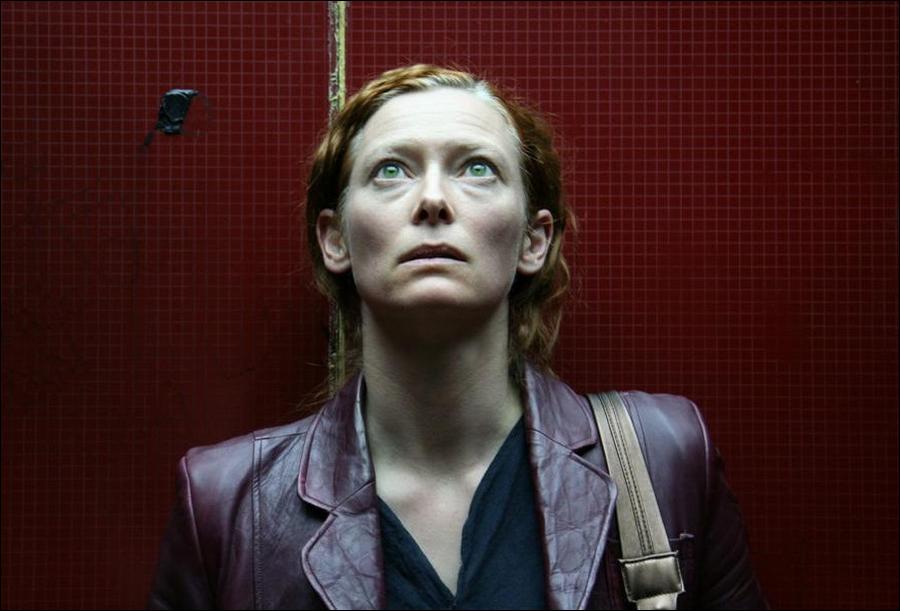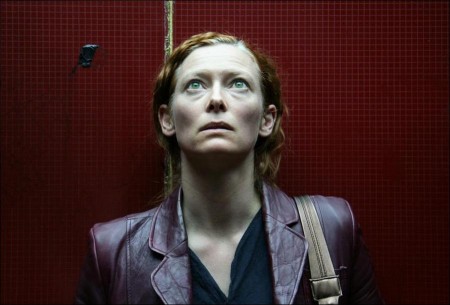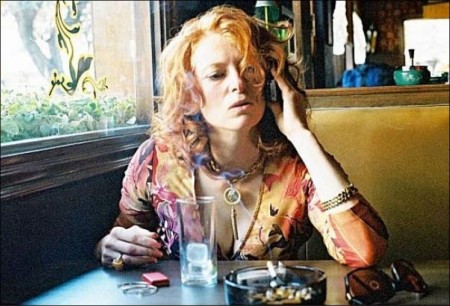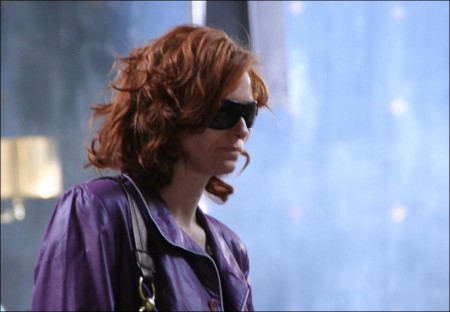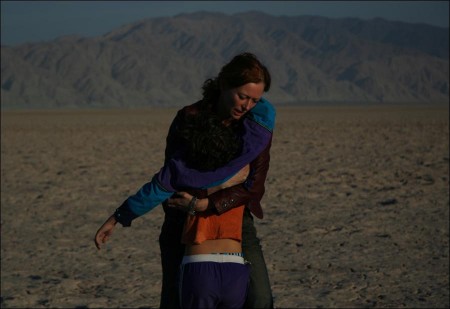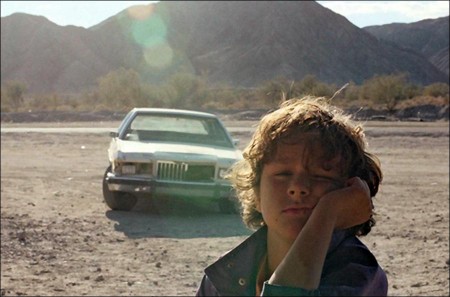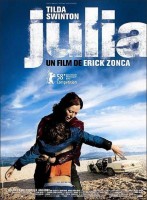They spend two days in preparation for the exchange. Julia and Tommy start to interact more. Julia leaves Tommy in the desert, promising him that she will bring him to his mum, before she drives into the city to get the ransom. But before Julia gets the money from the locker at the bus station, as arranged, she notices that there’s police around and leaves in a hurry.
When she comes back to the desert, Tommys gone. She spends the night looking for him, finally finding him in the morning, passed out and almost completely dehydrated. She gets him into her car, gives him water and then hides with him, not knowing what to do.
In the evening, the border patrol finds her car while they are looking for immigrants. Again panicking, Julia takes off and arrives in Tijuana, Mexico with Tommy.
Tommy starts to trust Julia and begins to look forward to meeting his mum. While they are shopping for clothes, Julia meats Diego, who offers himself as a tourist guide. She declines.
Later she gets a call from Tommy’s grandfather who tells her to call Mitch. She does and Mitch says that he has been in contact with the grandfather and that he would come to wherever she was and bring her the 2 million dollars, no questions asked. She tells him to come to Tijuana, which he will the next evening.
In the evening, Julia and Tommy go out to get something to eat, running into Diego again. The next morning, they both wake up at his house. Tommy’s in bed with a girl, when Diego gets him and brings him to Julia. They cuddle for a while before getting up.
Julia enjoys the sun, when suddenly she notices that she doesn’t know where Tommy is anymore. She gets the little girl Tommy woke up next to, to help her find Diego. Diego doesnt know where Tommy is sure that he has been kidnapped.
Anxiously they wait for something to happen, when Miguel, a taxi driver, turns up with a message: Somebody kidnapped Tommy and they want &50,000 ransom from Julia, who they take for his mom.
Julia is devastated. She doesn’t want anything to happen to Tommy but she doesn’t have the money either. And even if she had the money, she’d probably count on her ability to fool them to not have to share. But she tells Miguel that she will have the money in the evening and gives him her phone number. When he leaves, she leaves Diego behind and follows Miguel. He goes to the police station and her phone rings; its the kidnappers.
When Miguel comes back out, she continues to follow him until he’s at home. She surprises him there, demanding answers. They start to fight and she shoots him. Then she starts to rummage through the flat to find some hint about Tommy’s location.
She finds nothing, but a little while later, a woman carrying groceries comes by looking for Miguel. On a whim, Julia follows her to an almost completely ruined apartment building. There she finds Santos and a friend of his, who have Tommy.
Santos asks her how she could find him and she tells him that Diego told her where they were.Julia gets locked in with Tommy, promising him that she will get them out of there.
A short while later, Diego shows up. He works with Santos and says that Julia lied, he hasn’t told her anything. Santos doesn’t believe him and finally shoots him.
Santos’ friend leaves and Julia talks Santos into going with her and Tommy to the airport, where shed give him 1 million dollars.
Before they can get very far, though, Santos friend shows up again. Mitch calls Julia and Santos overhears him talking about 2 million dollars. He demands everything from Julia. His friend takes Tommy with him and Santos drops off Julia at a car.
She drives to the airport, meets Mitch, who gives her the money and tells her that he’ll be waiting at the airport hotel for Tommy.
Julia drives back and meets Santos. She tells him that shes not Tommys mum, but that she kidnapped him herself and that she would give him 1 million to get the boy back. If he doesnt agree, then he can shoot Tommy, she doesn’t care.
Santos agrees. They meet in the evening on two sides of a big street, with a lot of traffic going on.
Santos runs over to Julia, she gives him the money and he tells his friend to let Tommy go. But Tommy gets stuck in the middle of the road. When Julia tries to get him, she loses her gun and Santos takes his chance.
He demands the other 1 million dollars or he will shoot the boy. Julia tells him that the money is in the car and he and his friend take off, leaving them stranded in the middle of the road.
Interview with Tilda Swinton
Q: How did you become Julia?
A: I heard about the film in a rumorish sort of way before there was any kind of official approach because I had met Zonca in Cannes in very frivolous circumstances and I really liked him. He is an extraordinary animal with a very rare instinct. I remember somebody saying of Rossellini that he just films the facts, and that’s what Zonca does. He just sets it up and films the facts. He’s not a witness, he wants to be inside the character’s head, and all around them and embrace them as well. I think that’s unique and I want to be a part of it.
Q: How would you describe the character?
A: There is a major relationship at the beginning of this film, between Julia and drink. In the opening bar scene, there are fifty people, all drunk, but they’re drinking because it’s Friday night and maybe only drink one Friday night in four or six. However, there is a couple in there that are dangerously alcoholic and Julia is one of them. But she doesn’t look it. You see her in theory having a great time, but really she’s there for the drink, and she’s eating onions and olives out her cocktail because it may be the only food she eats all day. As a result of her alcoholism, Julia’s addicted to lying. She doesn’t know how to tell the truth and doesn’t even know that it’s a good idea to learn. She’s got her foot on the accelerator so hard and it’s all going in the wrong direction, and the further she goes the more helpless she is.
Q: The only way for her is down?
A: When we meet her, Julia’s really in a state of terror. When Johnny kicks her out of a taxi and doesn’t even pick her up, you know that life’s getting really tough for her. One of the scenes I love, because it’s possibly one of the only moments when she tells the truth, is when she goes to see Nick, her ex-lover, and tries to persuade him to do this scam with her. Twenty years or even ten years ago, it would have worked beautifully, but now her life’s falling apart. If you’re looking for a motive for why she abducts the boy, Tom, it’s because she’s running scared.
Q: Her meeting with Tom is crucial…
A: It’s a defining moment for Julia. We see her as some kind of washed up party girl, but at that point it cranks up a gear in terms of her alienation. An alcoholic is alienated. You can’t really say Julia has a relationship with anybody. She’s chewing them up and spitting them out. The only reason she pays any attention to Elena is because she starts talking about money. With the boy, it’s different because he doesn’t behave the way she expected him to behave. She thought she was kidnapping a 4-year-old, but she gets a 9-year-old who is at least as tough, if not tougher, than her.
Q: How does she relate to him?
A: We wanted to do a fairly radical thing, to show a woman not in touch with her maternal feelings. In the cinema, that’s a rare thing to show because there’s this sort of kneejerk thing that all women have them. It’s monstrous that a woman at this stage in her life does things like holding a gun to the head of a child. On the other hand, she comes to the aid of another person and she’s just so real that you’re still rooting for her.
Q: What is the impact on Julia of their escape across the desert to Mexico?
A: I love the fact that she’s the only American I’ve ever seen on film crashing her way through a wall into Mexico. In CityplaceL.A., there is a certain claustrophobia. It’s not about buildings, but a lack of vista. And then in Tijuana, when she wakes up after her night with Diego, she looks out over that shanty town and it’s beautiful to her. There’s a texture to it. It’s more beautiful than pulling on a green paillette dress. She has escaped. And then twenty seconds later, she’s chasing after gangsters who have taken Tom.
Q: As well as crossing borders, the film crosses genres…
A: I like the randomness of suddenly finding yourself in a completely different film, a thriller, a gangster movie, a film noir. My understanding is that it’s a very alcoholic state to be in. You’ve suddenly got yourself into something way deeper than you thought you had and by the time you notice, you’re halfway down the road with a gun at your head. Formally, it’s risky, but in terms of atmosphere and territory, it’s really radical.
Q: The film doesn’t attempt to explain Julia’s addiction…
A: I think it’s really brave not to do that. Where is the scene where Julia says, “You know, Elena, I’m going to help you because you remind me of my mother.” She doesn’t work that way. She has an animal’s survival instinct. She loses the boy, but she manages to get him back. And she manages to come up with another lie at the end. Easy come, easy go. In the heart of the character and therefore in the heart of the film, is the ability to be totally random, to do things without any motive. It’s rare in a film about an addict that you don’t see her breaking down and saying, “My life’s a complete sham.”
Q: Julia’s a prizefighter, knocking down all-comers. Is that how it felt playing her?
A: I felt very much like a fighter. Erick and I agreed that it should be physically exhausting because she’s beating her body up in so many ways. There’s a sense of constantly being in a sweat, whether it’s because of having to find a way out of a crisis or create some lie or other, or whether it’s just walking around in those shoes in L.A. or Mexico, wearing clothes that are too tight. The physical battle is relentless. In performance terms, this is a first for me. I’ve always been concerned with taking facets of my own experience and blowing them up into a story. Before Julia, I’d never gone so far outside of the shapes that I personally make.
Q: What was it like shooting the movie?
A: The atmosphere on set was really feral because we were also running ahead of ourselves. We were always running scared. You didn’t have to be playing Julia to feel a light sweat on the back of your neck. We were up against it. In Mexico, although we loved it and shot with a phenomenal crew, it was hardcore shooting. It was like trench warfare, but it was very much a film made by a tight group of people. Every department was stretched.
Q: And working with Erick Zonca?
A: This film feels like the beginning of the work that I’ve been looking forward to doing really proud of it and relieved it happened because I’d been wanting it to come along and there it was. There’s something about the opportunity with this film and this filmmaker. His cinema feels like something emotional, even spiritual. Zonca’s characters are survivors. It’s all about the persistence of the human spirit. It’s incredibly optimistic. And what’s so refreshing is that it’s genuinely amoral. There is no great statement by the European artist about the state of America and its bordering nation. There are no great claims made. I find that properly modest and responsible somehow.
Production notes provided by Magnolia Pictures.
Julia
Starring: Tilda Swinton, Saul Rubinek, Kate del Castillo, Aidan Gould, Jude Ciccolella, Bruno Bichir, Horacio Garcia Rojas
Directed by: Erick Zonca
Screenplay by: Michael Collins, Camille Natta
Release Date: April 24th, 2009
MPAA Rating: R pervasive language, some violent content and brief nudity.
Studio: Magnolia Pictures
Box Office Totals
Domestic: $65,108 (4.9%)
Foreign: $1,268,133 (95.1%)
Total: $1,333,241 (Worldwide)
